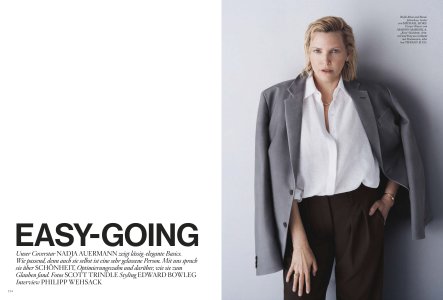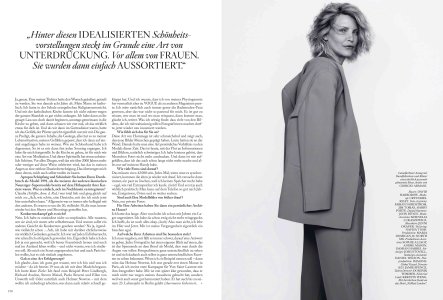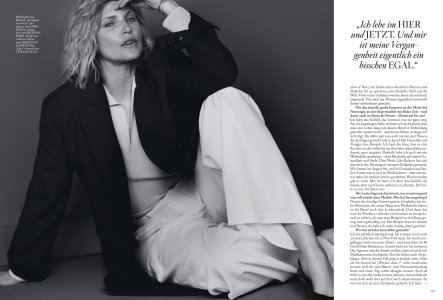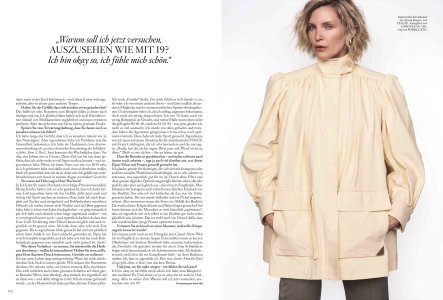(I'm not fluent in German so this translation could be sketchy. ...Where's Mullet when you need her...)
Our coverstar, Nadja Auermann, showcases casually elegant basics. Fittingly, as she herself is a very relaxed person. She spoke with us about beauty, the obsession with optimization, and how she found faith. She dances—or rather, she dances. And of course, it looks elegant, because someone who moves with 112-centimeter-long legs (which even have an entry in the Guinness Book of Records) simply radiates something impressive. During the shoot, a playlist of Diana Ross songs plays. And Nadja Auermann stands on set, gently swaying along. When asked how she would feel to be in front of the camera in London today, she answers with a relaxed shrug: "Oh, the same as always." Unlike in the past, photo shoots are no longer a daily occurrence in Auermann's life. She has withdrawn from the fashion world in recent decades. The 54-year-old now lives in Dresden with her husband and her two youngest daughters (born in 2010 and 2013).She casts a critical glance over the photographer's shoulder at a few pictures, while Madonna's "Open Your Heart" plays from the speakers. Auermann begins to quietly sing along. When she notices that she is infecting the team with her good mood, her ice-blue eyes begin to shine – and she dares to raise her voice a little. The mood is excellent. During the lunch break, the supermodel sits with the crew, showing photos of her poodle and her cats. The catering service serves up tofu curry with rice, and when the topic of the Olympic Games comes up, Nadja Auermann leaves no doubt about how little she approves of it. Then she heads to the makeup room for a touch-up – where we've arranged to meet her between powder puffs and hairdryers for an interview.
Your "comeback" cover at VOGUE is our May issue, which explores the essence of beauty across all themes. Where do you discover beauty?
For example, in the music that's playing right now (in the background, "When a Man Loves a Woman" by Percy Sledge is playing very loudly, editor's note). Beauty is everywhere for me. Whether I see the magnolias and cherry blossoms outside, sunshine, sunsets, cloud formations. Beauty makes me happy. When you focus on beauty, you generally go through life happier, that's my feeling.
Has there been a recent experience that you found particularly beautiful?
I was baptized in 2020. I've always been very religious. However, I grew up in a family that actually rejected religion. But I always believed in God. For me, beauty is something divine. It is the manifestation of love.
Let me do the math... so you were 49 when you were baptized?
Yes, exactly. One of my daughters had expressed a desire to be baptized. She was eight years old at the time. My husband is Catholic. I had Protestant religious education at school. And I couldn't relate to the Catholic Church at all, not least because of all the scandals. So I said to her: Let's start by going to church together on Sundays, and then we'll see if it's really something for you. And when we were at the service, I had the feeling the priest was actually only talking to me. The entire sermon, the entire content, the songs, everything fit my life situation and my feelings so well that I suddenly started to cry. I sat there like a baby. That's how it was for me almost every Sunday. I realized for myself: Going to church is like a kind of meditation for me. And there's something incredibly beautiful about this spiritual aspect. Above all, because it has been celebrated more or less in this way for over 2,000 years, it has a timeless right to exist in my eyes. This convinced me to be baptized myself.
Speaking of Schi.ipfung and Schi.inheit: You had your breakthrough as a model in 1991, when most of the other iconic 90s supermodels were already at the peak of their careers. Was it easy to integrate afterward?
Claudia (Schiffer, editor's note) was really nice and immediately approached me: "Oh, how schi.in, a German I can now talk to here." In general, it was always very friendly with the others. There were around 20, maybe 30 of them that you met again and again at the shows and photo shoots.
There was no competition?
No. At least I didn't feel that way. Everyone knew who they were; we were very confident. And why should another face be seen as competition? Well, maybe in a way... Oh, to be honest, I never really thought about it. In any case, I was surprised at how quickly I became successful. Actually, I only took the job because I wanted to learn French better and live abroad again—and I didn't know what to study. When a scout approached me and wanted to bring me to Paris, it just seemed like a good fit.
Was there some kind of recipe for success?
I think I knew pretty well who I was and what I wanted—since I was already 19 when I started modeling. I had clear goals: I loved Peter Lindbergh, Richard Avedon, Steven Meisel, Paolo Roversi, and Ellen von Unwerth, for example. Or, of course, Helmut Newton—I really wanted to work with him, which happened relatively quickly. It worked. And I knew that, based on my physiognomy, I was probably more suited to VOGUE than to other magazines. Of course, I would have always liked to be the swimwear woman, but that wasn't really a good fit for me. It's good to know who you are and where you fit in; then I think you can get ahead. What I find funny is that many of the pictures I was able to take with incredibly great photographers are now being re-staged.
How does that feel for you?
This kind of homage is very flattering and also shows how those images influenced people. People had them on their walls. Back then, you had a kind of personal relationship with the models of that time. Today, with the flood of information and images, that's naturally more difficult. I recently heard that people don't print photos anymore. And then I realized that I haven't done that for a long time either and that I only have everything on my phone.
How many photos are on it?
That must be about 42,000. Every time you synchronize, the old ones come back. I always try to delete a few because I'm running out of storage—no matter how much extra storage I buy. (laughs) And it's really practical, too: You can search for years, events, places, and so on on your phone.
Are your model photos from earlier on there too?
No, just private photos.
Do you have a personal archive at home for your work?
I had one for a long time. But now I've been renting a storage unit for years. I haven't looked in there in ages. I hope everything's still okay there. (laughs) So you see, I live in the here and now. I don't really care about my past.
Which of your works are you particularly proud of?
I have to admit, I always find it difficult to answer that question. Every photographer has their own perspective on you; that's the exciting thing about the modeling profession: you get to see yourself in completely different ways through the eyes of great photographers, and you also get to see yourself in completely different facets. If I had to name an example, it would be Helmut Newton. I had just been in Paris for a month when I shot my first campaign for Yves Saint Laurent with him. It wasn't until later that I realized he booked me not just because of my looks, but because we got along well in other ways as well. He also lived in Berlin (Auermann's birthplace) until he was 23. Editor's note: We had a similar sense of humor, a similar way of speaking, a similar view of the world. Many of his works are considered sexist today. For me, Helmut actually pointed this out humorously.
Does the current great interest in nineties fashion, in the supermodels of that era—and thus in you as a person—put pressure on you?
I have the feeling the interest never completely disappeared. When I started, I didn't expect that you would be associated with this profession your entire life—and that you would carry this fame with you for so long. Up until then, there had only been a few women who had done it longer. Jerry Hall, Veruschka, and Twiggy, for example. I found the idea of it being a career that might only last five or seven years quite attractive. That's why I worked like a workaholic—without regard for my health or soul. Back in the 1990s, no one thought about work-life balance. We had August off because it was the holidays in France and Italy, and at Christmas, but otherwise I just worked all the time. There were no weekends. At 26, I felt like I could stop working. I had a kind of burnout. People always wonder what's so exhausting about being a model.
What drained you?
Primarily the constant travel. I think for many people who tend to be workaholics, their job is also their passion. And then you have the tendency to maybe pay a little too little attention to things like whether you're flying too much, or eating enough and regularly. The body simply needs breaks, and I wasn't really paying attention to that.
How did that manifest itself?
I was suddenly constantly sick. I still remember a job I had in New York. I was flown in, stayed in an expensive hotel, and then I got a 104-degree fever and couldn't make it to the set. The agency and the client wanted me to boost myself with medication. That often worked in the past. But in this case, it simply didn't work. Or once I couldn't appear on "Wetten, class . .?" because I had a bladder and kidney infection and had to cancel the day before. There, too, I was told to just take something, then I would be able to sit down on the couch. Things like that started happening a lot at that time. IThen I had my first child – and continued working after that, but at a completely different pace.
Do you feel like anything has changed since then?
I very much hope so. Concerts, for example, are canceled more often these days. I think artists used to just drug themselves and then perform anyway. But that only works up to a certain point.
Do you feel an expectation that you have to look the same today as you did before?
For a long time, I felt like I had to look the way I did in the 1990s. But at some point, I started having health problems. I have Hashimoto's (an autoimmune disease that causes chronic inflammation of the thyroid, editor's note). Now, menopause is on top of that. Three or four years ago, it was COVID-19. This period led me to not do as much! I was able to exercise – and gained weight. When I look at photos of myself today from 2019, when I got married and wanted to lose weight again, I personally think I was too thin. I like myself better now, at what I consider a "normal" weight.
You were on a diet because of your wedding?
Yes. I had a real princess dress for my wedding. My children had so wanted me to get married in it. And somehow I felt like I had to do a lot of exercise for that. I also completely gave up sugar and mostly carbohydrates. Although I used to eat a lot of pasta and lots of bread, I stuck with it for almost two years – it went surprisingly well. I had been a vegetarian for a long time – and I still mostly do – and I actually thought that a low-carb diet without meat was almost impossible and actually unhealthy. I ate a lot of eggs. Until something clicked, and I suddenly felt sick at the mere sight of eggs. Then it completely reversed, and I started eating only carbohydrates, which of course isn't healthy either. (laughs)
Was this behavior—thinking you had to lose weight for your wedding—perhaps internalized? Did you feel pressure to lose weight at the beginning of your career?
I've been underweight my whole life. When I went for a checkup, it was always the same thing: We need to check your iron levels, you need to gain ten, preferably twenty kilos. Of course, that casts a certain shadow over the entire industry: If you think about it, someone who was actually far too thin—and was always teased for it in school, by the way—suddenly finds herself in the fashion world with all the tall, thin women.
I found his "family." Back then, it felt like I was from another planet—and had finally found the other members of my extraterrestrial species again. And yet, when I started, I was advised to lose a little weight. I was 19, still had a bit of baby fat on my face, and my breasts weren't the sought-after 90-60-90, but 92-62-92—which, I think, doesn't matter so much now. I was booked by everyone, and yet the agencies said I could still optimize it. Then I started exercising more. At some point, I was on a shoot for American Vogue with Grace Coddington, whom I admire greatly, and who told me: "Nadja, don't let anyone tell you what to do. Please be careful. Don't get too thin." Stay the way you are - it was good to hear that. The fact that the industry worked this way—and certainly still does in some cases—says a lot about what this body focus has done to women in general. I think, especially for those who spend a lot of time on Instagram or other social platforms, it's very difficult to recognize what's actually good for them. These filters and all these digital optimization options make everyone look perfect, but also the same—that's my feeling. You can quickly get a false impression of reality on Instagram. I view this much more critically than what we used to do. Maybe a pimple was airbrushed out. But otherwise, the photos were a reflection of reality. No bodies were made thinner or legs made longer. And today, people can artificially "optimize" themselves to such an extent that they can no longer be happy with themselves in reality. This is probably one reason why beautiful young women have surgery.
Do you remember a time when your body was negatively judged?
I still remember a fitting for a Chanel show. Because I have such a short torso with a broad chest compared to my long limbs, the two-piece suits in particular often had to be altered for me. A seamstress once asked me if I was a swimmer. I thanked her because I took it as a compliment – from her reaction, I realized it was actually a diss. (laughs) But for Karl (Lagerfeld, editor's note), that wasn't an issue.
And now that you weigh more – how do you feel?
I'm okay like this; I do feel. For example, I have a rounder butt. And being a little curvy is fine too. Everything in its own time. Why should I try to look like I did when I was 19?










